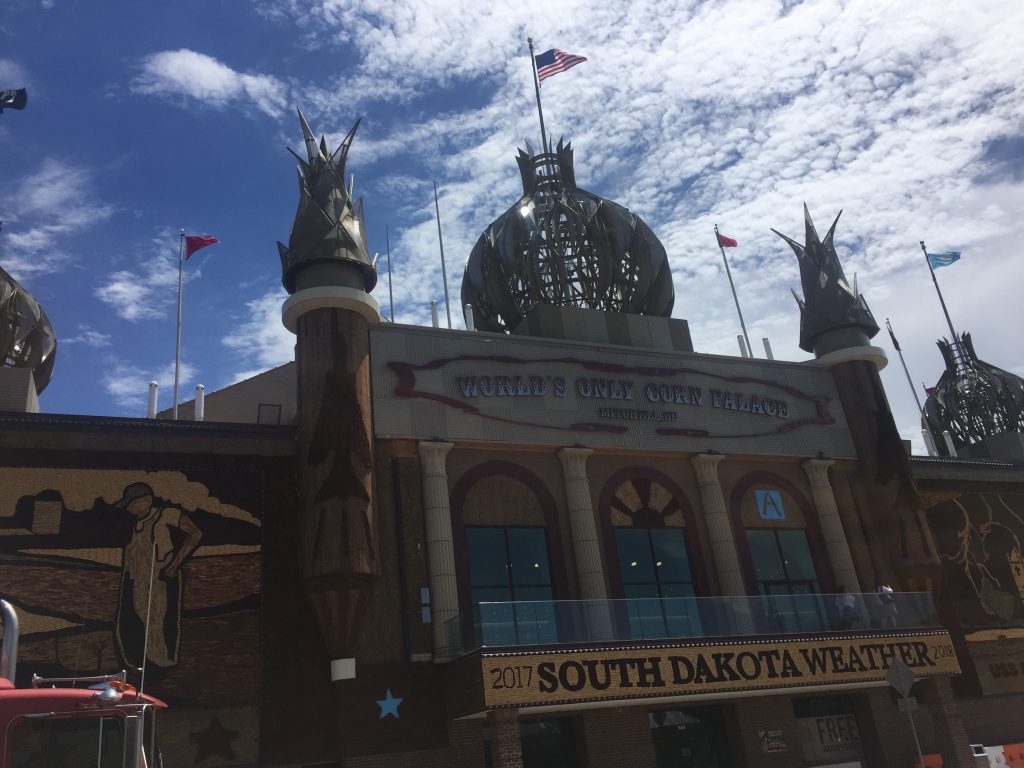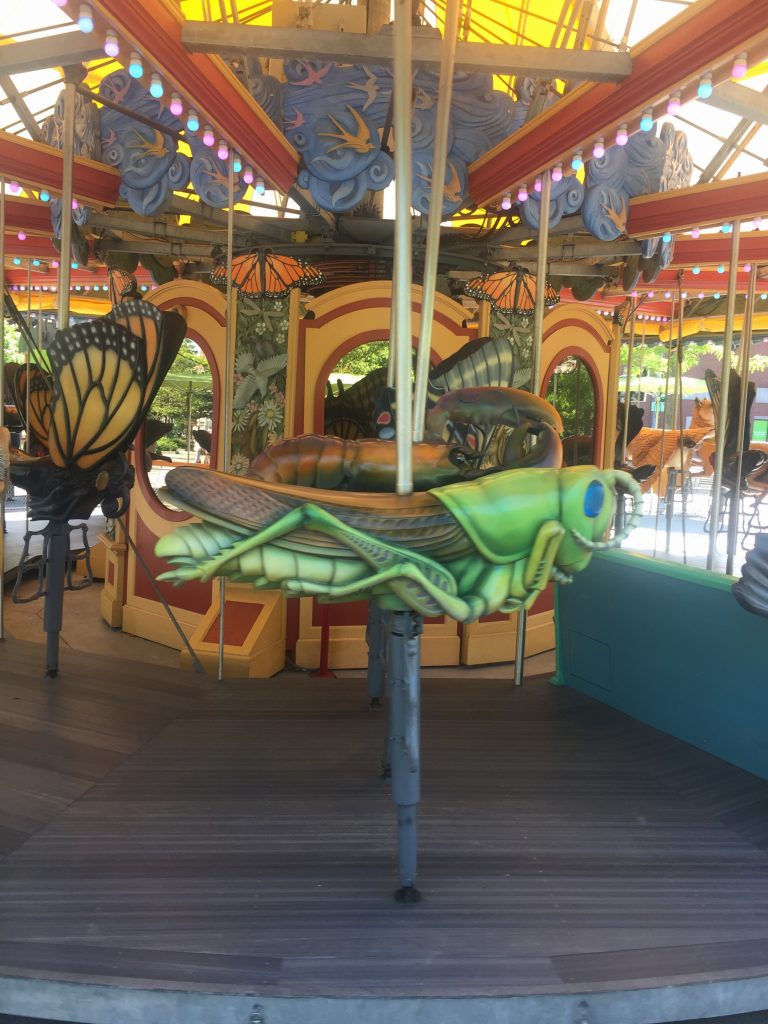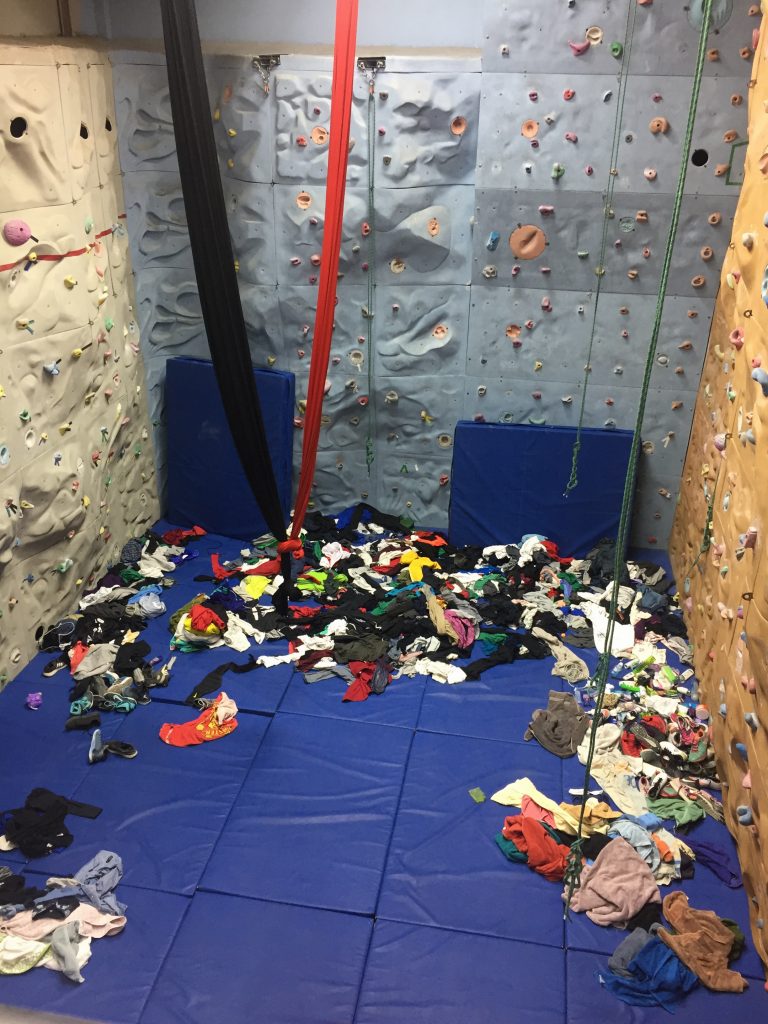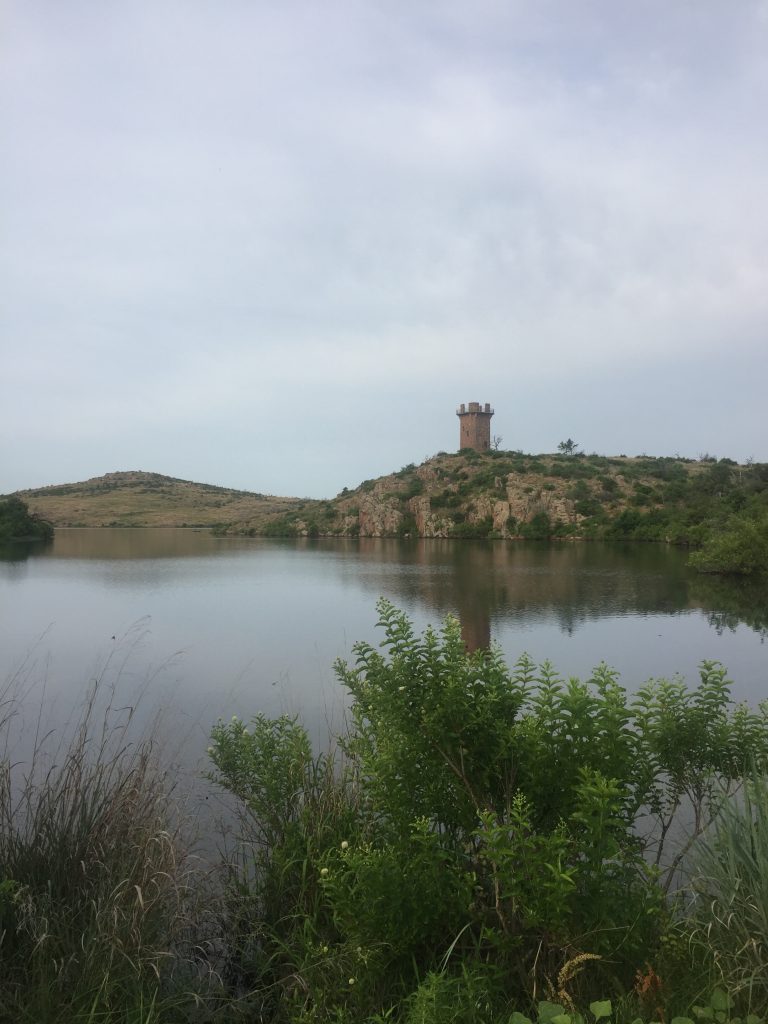
With some rough calculations, I gather that there is about $2000 between the men that play the game. The $2000 more or less shifts between players, though the bulk of it sits between two men: Caleb and Sebastian. The rest of us are used to losing a little every night- ten bucks here, twenty bucks on a rough couple of rounds. Sometimes we even come out on top, but the longer I watch, the more I see the money sliding across the table to those two.
Nobody seems to mind.
Eddie stands outside my motel room, his lanky silhouette framed by the open door, breath emerging in a fog. He worries about the woman next door- it’s been a long time since I’ve heard her pacing. He tells me how Sebastian created the game:
‘Sebastian worked night shifts at some shithole gas station, right? Some place way out on the highway, out where there isn’t any light but headlights and the fucking stars. Not the sort of place where people come twice, caters mostly to truckers and families on holiday and people on the run. Thing is, he says he started seeing patterns in the folk that came around for gas and jerky.
A guy comes in looking for scissors, says he can’t get the package of his new earbuds open without’em. Guy comes in a month later- different guy, same story. Another guy’s always looking for some flavor of chips they quit making. A woman comes in to buy gardening gloves every three weeks. Who buys gardening gloves at a gas station? Who needs’em in the middle of the night?
So these people are all different but they’re all fulfilling roles. They’re acting out parts. He starts to see the whole thing like some sort of TV drama, starts to know what to expect. He writes’em down, doodles little pictures of’em. So the Scissor Man, like, the card, you know? The Scissor Man is pretty regular so there’s a few of him in the deck. And he’s not tied to the moon so the card’s black. The Chip Eater only came around when the moon was, you know, getting bigger. So the card’s yellow, like the moon off the highway. And he never finds what he’s looking for so he’s a losing card.
Sebastian says he near offed himself when, all said and done, he figured there were really only 48 types of people that ever came in off the highway. Said the same about people in the daytime, too. We’re all just a Scissor Man or a Dusty Shade or a Gas Guzzler. All of us just fit into those 48 slots and some of us are so common as to be around every corner or so useless that nobody wants us shitting on their hand and eating up their chips.
Only thing that kept him sane was getting away from that gas station and making it all like some game he gets to play with dudes at the end of the day. Makes it about money again which, I suspect, we all kinda think it’s about, really. Play some cards, make some money, right? You in for this Friday? I’ve got a good feeling.’
I have seen Sebastian eyeing me across the table and, before I could take it personally, I’ve found him eyeing the others. He sees us in the cards and he plays us like his hand, pegging each man at the table with his gas-station archetype.
Friday comes along and I flip a hand of Amorphous Children, one of each suit. It’s impressive, maybe the best hand I’ve played in my time at the table, and it wins me several hundred dollars in chips and a few stinging back slaps. Not unexpectedly, I begin to lose again. Sebastian knows the ins-and-outs of the game and of the men. It would take years of play before I was able to win against him consistently. Instead, I try to lose in a very specific way, conceding round after round to Caleb, even when I may have otherwise held out.
Suddenly, Sebastian’s eyes are on Caleb. He understands something has happened, but not what. Maybe Caleb is a Gibbous Dusty Shade. Maybe he’s the Walking Drunk. Sebastian tries to reconcile the change with the archetype and he fails. By the end of the night, his system has begun to crumble. He makes violent, clumsy plays that ruin Caleb and allow other men to win. He pays no mind to me.
I wonder if he would tell me my card and, at the same time, I dread knowing.
-traveler
Something is coming. I feel it before the men tell me, before even Eddie, who is so loose-lipped, let’s slip that the little games we play every Friday night are building to something bigger. Finally, at the end of a particularly slow round, a man named Matthew clears his throat and asks:
“Think we can fit a Saturday game in next week?”
The others cough and nod and scratch their ears and one by one their eyes turn to me. They have spoken of this already and agreed. They’re asking me.
“I’ve got nothing planned,” I tell them, and I wonder if they can hear my heartbeat dancing in my chest.
I win the next round.
Last week was close.
Last week, during a bathroom break, I asked about the ‘Library of Urban Legends’ and they pretended not to hear me. I asked and Caleb put out a cigarette, hardly halfway burned, and suggested he might take an early night. The whole game was called early. I packed my bags and lay awake in my motel room, listening to my neighbor pace and cough. I stared at the white bulk of my backpack in the moonlight and I considered the tenuous allegiance of man.
And then, the next day at the store, it was though nothing had happened. I had gotten off with a warning and I spent another sleepless night shuffling cards until they warped and split. Now, as the motel’s digital clock ticks itself toward a crimson 3:00am, the pocket of my jeans buzzes with a message from Eddie:
‘We’re in charge of food for Saturday.’
And then:
‘Barbecue.’
My seasonal employment at the store does not grant me any particular discount on its products so Eddie, with his name thickly embroidered on his breast, accompanies me to the back in order to ‘negotiate’ with the Meat Department. As a stocker, I am more than familiar with the labyrinthine warehouse in the back of the store- a place that is too large and too convoluted to exist in the shell it presents to the outside world. I have seen, occasionally, the once-white door of the Meat Locker, these visitations always preceded by a stark drop in temperature. I have seen Veronica, the manager there, her apron stained red and her eyes glittering.
“She kept fucking whispering to customers,” Eddie explains, pushing through a wall of stacked toilet paper, “And, like, it’s not against the rules. And we thought she had some mental thing so they didn’t fire her. And… Jesus!”
Veronicastands in a pool of pink froth, running a rag back and forth across the cooler’sdoor. She wrings the cloth onto the floor and dips it in a bucket at herfeet, the liquid there tinted red and steaming.
“Veronica,” Eddie says, holding a box of cereal to his chest as though it will ward off her eyes, “Me and some of the guys were, uh, looking to barbecue this weekend. Think you can hook us up?”
Veronica does not turn. She drops the rag into the bucket and leans forward to rest her head on the door, as though vexed by Eddie’s request. Eddie himself has been moving backward, his footsteps so small as to be imperceptible to the eye. I stand several inches ahead of him, now.
Veronica turns, finally. She is tall- taller than me- and her arms are long and lanky. Her face and hair, where they touched the door, are stained red. Red, too, are her hands, her apron, and her eyes (the latter as though she has been tired for a long time, or sad). Eddie’s box of cereal collapses under her gaze and he sets it back on the shelf, crooked and leaning. He clears his throat and says:
“Seems like They should give you guys gloves for that.”
It’s an absurd time to invoke the capital ‘They’- ‘They’ being the store’s faceless administration and this being a lowest-common-denominator conversation starter. I tried, once, to complain that ‘They’ were taking their time fixing the punch-out machine and was quickly shut down, having not yet earned the right to complain. Eddie, a veteran, derides ‘Them’ in the lull of every conversation. Something tells me Veronica, who wipes her forehead with the back of her hand (smearing the red stain down over her eyelids) does not care for, or even know about, ‘Their’ policy on wearing gloves.
And yet, she smiles. It’s a mean smile, one that reveals a row of sharp, crooked teeth as she pulls her hair back into a ponytail and slips a tie from her wrist, but the meanness is not for us.
“Youknow what They did?” she asks, “They told me it wasn’t my job to wash thedoor. They said to leave it for the night crew. This,” she says, gesturing to the red mess around her, “This is myday off.”
She draws gloves over her red, dripping hands.
“So, you guys need some meat?”
I think of Veronica’s hands as we play the game.
The novelty of Saturday is that we do not stop to eat. We leave great, greasy prints on the cards, we smear them with sauce and saliva and spilled beer. We play a deck until it sticks to itself and will not come apart or until we suspect an opponent has learned to identify the important suits by the crust on their edges or by their texture and smell. Marinade and cigarette ash congeals on the table. The smell of charcoal hangs in the air.
The meat makes me sick, the sheer quantity of it. I excuse myself to the restroom and see my own face stained red and streaked with ashen warpaint.
Alice’s picks rattle incessantly. The bike rusts in the motel parking. The pages of ‘Autumn by the Wayside’ wilt like the petals of a dying flower.
This is all taking too long.
As long as I lose more than I win I will always be less than a friend to these men.
Time to start winning.
-traveler
I lose money, but not so much that I lose my room at the motel. A week passes and, with it, several more games. I lose less, but my relationship with these men remains purely transactional. I see their interest wane as my money does. Eddie is the exception- he seems like the sort of guy that could use a friend. I do what I can to fulfill that need.
The apartment in which we play has a room set up for the game. There are layers of ritual underneath the crushed cigarette butts and plastic chairs and I trip over myself trying to maintain these unspoken traditions. A man always coughs when someone enters the room, for instance. A toilet-stall cough- a polite, if unnecessary, acknowledgment of another soul’s presence. I have the cough, now, and I could not let Eddie into my room without a small croak.
Someone must always be smoking. This one was difficult for me- I learned only as the room became tense watching a curled cigarette turn to ash on the edge of a plate, a full pack having materialized near my elbow and a matchstick having perched itself between my lips. I lit up (my first in a long time) and the collective sigh of relief snuffed the failing cherry at the table. I won the next three rounds.
Behind each chair (and, so, behind each man) is a picture of a nude woman and it is customary to call these women by their names and to ask them for luck when the deck draws foul. The men at the table regard these foldouts with worship and fear. Upon returning, too early, from drinks on the porch, I found a man, Caleb, on his knees in the room, pleading with a woman named Candy that he win the night’s pot. Perceiving me in the doorway, he coughed and rose on stiff knees. He had been weeping, but he was not ashamed. I regard Candy fearfully, now. I dread the eyes of the women on my back and the eyes of the men on the women. They are everywhere- looking out from the magazine racks in the check-out lanes, peering from the calendar in the motel lobby when I go for a cup of watery coffee. Always the picture of a woman, always the eyes of a man. Eddie points them out to me, sometimes. He laughs and rolls his eyes.
Ilaugh, too, and I cough and smoke and stare and ask the women favors and callthem by their names. They see through me and I begin to lose, but my lossesendear me to the men and so I stay the course.
-traveler
No, no. This long autumn has tried to turn me away before. No wall has been too high to climb, no bramble too sharp or thick to press through. Now this- kept from a place for lack of a friend, for a failure to be in the know. There is time for friendship, I think. For the lowest bar of friendship, anyway. I dredge my resources, picking through the leaves and mud of the Wayside until I’m sure that I’ve narrowed the ‘Library of Urban Legends’ to a region that spans four counties. I rent a room in the center at a motel that accepts long-term guests. I pay by the week. I set out to make a friend.
It has been too long.
The woman in the room next to me will die there. She tells me as much, but anybody standing in her doorway would know without having to ask. She is painfully old and her sickness hangs in the air around her like a dark cloud. I dare not go into that room and she dares not leave it. We are of different worlds.
The farmer in the room on the opposite side is a young couple the next morning. They are friendly and impermanent- good for practice, though I see them toe the threshold of my room and I wonder what cloud hangs about me.
I drink, alone, at bars. I read books in the park. I take the bike apart and put it together again, exchanging pleasantries with a group of older men who sit and sip coffee at the edge of the parking lot. They see through me- are disturbed by my appearance each morning. I am a ghost, here, narrowing my haunts.
Itake a seasonal job at the local store to make up for three-week’s failure-pay at the motel: bagger,stock-boy, department store jack-of-all-trades. It’s simple work, unionized ifI stay on after the holidays. I wash my uniform in the sink and dry it in theshower. People learn my name.
Myname is the bait, a distraction from the looming prison above it, from the flimsystick-and-string trigger. Sometimes the anticipation is such that I hold my breath without realizing, turningblue as I slide boxes of turkey stuffing onto shelves. The world is filled witha nervous darkness. Hold your breath long enough and it creeps in from thesides.
Another stocker emerges from the shadows and mistakes my sudden exhalation for a gasp of fear.
“Easy,man,” he says, “Didn’t see you was in the zone.”
“Just wasn’t expecting anyone there.”
“You play cards, man? Got a game tonight, need some players.”
“Sure,” I tell him, “Where?”
He wavers at my eagerness.
“You know how to play?”
“Yeah.”
“You play for money?”
“Sure.”
His eyes narrow but the trap has already dropped around him.
“All right, bro. Sunset Condos #9. Come by after your shift. Name’s Eddie.”
He points to his name- embroidered in lush green thread. I point to mine, scribbled on a plastic tag.
Eddie’s not there when I arrive, but they’re expecting me all the same.
“Who’s this broken-faced asshole?”
“A friend of a friend.”
-traveler
I lose weeks searching for the ‘Library of Urban Legends’ but find nothing about its entry real or truthful. Nobody I speak to has been, but many know someone who has. Because I know nobody, I am forbidden from finding it.
-traveler
Rear View Mirror
- December 2025
- November 2025
- October 2025
- September 2025
- August 2025
- July 2025
- June 2025
- May 2025
- April 2025
- March 2025
- February 2025
- January 2025
- December 2024
- November 2024
- October 2024
- September 2024
- August 2024
- July 2024
- June 2024
- May 2024
- April 2024
- March 2024
- February 2024
- January 2024
- December 2023
- November 2023
- October 2023
- September 2023
- August 2023
- July 2023
- June 2023
- May 2023
- April 2023
- March 2023
- February 2023
- January 2023
- December 2022
- November 2022
- October 2022
- September 2022
- August 2022
- July 2022
- June 2022
- May 2022
- April 2022
- March 2022
- February 2022
- January 2022
- December 2021
- November 2021
- October 2021
- September 2021
- August 2021
- July 2021
- June 2021
- May 2021
- April 2021
- March 2021
- February 2021
- January 2021
- December 2020
- November 2020
- October 2020
- September 2020
- August 2020
- July 2020
- June 2020
- May 2020
- April 2020
- March 2020
- February 2020
- January 2020
- December 2019
- November 2019
- October 2019
- September 2019
- August 2019
- July 2019
- June 2019
- May 2019
- April 2019
- March 2019
- February 2019
- January 2019
- December 2018
- November 2018
- October 2018
- September 2018
- August 2018
- July 2018
- June 2018
- May 2018
- April 2018
- March 2018
- February 2018
- January 2018
- December 2017
- November 2017
- October 2017
- September 2017
- August 2017
- July 2017
- June 2017
- May 2017
- April 2017
- March 2017
- February 2017
- January 2017
- December 2016
- November 2016
- October 2016
- September 2016
- August 2016




